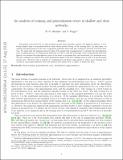An analysis of training and generalization errors in shallow and deep networks
Author(s)
Mhaskar, HN; Poggio, Tomaso A
DownloadAccepted version (2.524Mb)
Publisher with Creative Commons License
Publisher with Creative Commons License
Creative Commons Attribution
Terms of use
Metadata
Show full item recordAbstract
© 2019 Elsevier Ltd This paper is motivated by an open problem around deep networks, namely, the apparent absence of over-fitting despite large over-parametrization which allows perfect fitting of the training data. In this paper, we analyze this phenomenon in the case of regression problems when each unit evaluates a periodic activation function. We argue that the minimal expected value of the square loss is inappropriate to measure the generalization error in approximation of compositional functions in order to take full advantage of the compositional structure. Instead, we measure the generalization error in the sense of maximum loss, and sometimes, as a pointwise error. We give estimates on exactly how many parameters ensure both zero training error as well as a good generalization error. We prove that a solution of a regularization problem is guaranteed to yield a good training error as well as a good generalization error and estimate how much error to expect at which test data.
Date issued
2020Department
Center for Brains, Minds, and Machines; McGovern Institute for Brain Research at MITJournal
Neural Networks
Publisher
Elsevier BV
Citation
Mhaskar, HN and Poggio, T. 2020. "An analysis of training and generalization errors in shallow and deep networks." Neural Networks, 121.
Version: Author's final manuscript